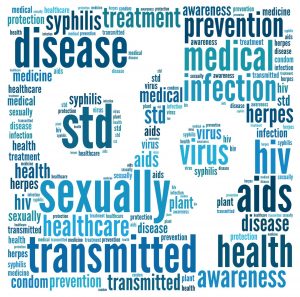We asked Dr Chris Eldridge to talk us through the benefits of Sexual Health Screenings.
Who should go for a sexual health screening and how regularly?
If you are sexually active, getting tested for STDs is one of the most important things you can do to protect your health. We advise the following groups to consider a Sexual Health Screening:
- All adults and adolescents from ages 13 to 64 should be tested at least once for HIV
- Annual chlamydia and gonorrhea screening of all sexually active women younger than 25 years, as well as older women with risk factors such as new or multiple sex partners, or a sex partner who has a sexually transmitted infection
- Syphilis, HIV, chlamydia, and hepatitis B screening for all pregnant women, and gonorrhea screening for at-risk pregnant women starting early in pregnancy, with repeat testing as needed, to protect the health of mothers and their infants
- Screening at least once a year for syphilis, chlamydia, and gonorrhea for all sexually active gay, bisexual, and other men who have sex with men (MSM). MSM who have multiple or anonymous partners should be screened more frequently for STDs (i.e. at 3-to-6 month intervals)
- Anyone who has unsafe sex or shares injection drug equipment should get tested for HIV at least once a year. Sexually active gay and bisexual men may benefit from more frequent testing (e.g. every 3 to 6 months)
What are the most commonly diagnosed STDs in Singapore?
- Chlamydia
This is one of the most common STIs in Singapore. It is a silent disease that doesn’t show any symptoms in almost 75% of women infected with it. It is caused when bacteria is transmitted during unprotected vaginal, anal or oral sex with an infected person. Chlamydia is easily treated with a course of antibiotics. However if left untreated, it could lead to serious damage to reproductive organs and even cause infertility.
- Genital Herpes
Genital Herpes is caused by the same virus that causes cold sores – the Herpes Simplex Virus (HSV). It is transmitted by having unprotected vaginal, anal or oral sex with an infected person. It can also be passed on from the genitals to the mouth – and vice versa – through oral sex. A person with the infection who doesn’t have any symptoms could still pass it on to a sexual partner. Symptoms: You may get symptoms a few days after you get infected, when small, painful blisters or sores usually develop. The sores can also ooze liquid or blood. They may also cause itching and tingling and possible pain during urination. Other possible symptoms are fever and swollen lymph nodes.
- HIV
There were 455 new cases of Human Immunodeficiency Virus (HIV) infections were reported among Singapore residents in 2015. This brings the total number of HIV-infected Singapore residents to 7,140 as of end 2015, of whom 1,816 had passed away. The number of new reported HIV cases has remained consistent at about 450 per year since 2008.
What advise can you give on how to minimize sexual health risks?
The most reliable way to avoid transmission of STDs is to abstain from oral, vaginal, and anal sex or to be in a long-term, mutually monogamous relationship with a partner known to be uninfected. For persons who are being treated for an STD other than HIV (or whose partners are undergoing treatment), counseling that encourages abstinence from sexual intercourse until completion of the entire course of medication is crucial.
 Sexual Health Screenings are available at any of our IMC Clinics.
Sexual Health Screenings are available at any of our IMC Clinics.
All Health Screening details can be found here.
Dr Chris Eldridge is based at IMC Jelita (T: 6465 4440).


 Genital Herpes is caused by the same virus that causes cold sores – the Herpes Simplex Virus (HSV). It is transmitted by having unprotected vaginal, anal or oral sex with an infected person. It can also be passed on from the genitals to the mouth – and vice versa – through oral sex. A person with the infection who doesn’t have any symptoms could still pass it on to a sexual partner. Symptoms: You may get symptoms a few days after you get infected, when small, painful blisters or sores usually develop. The sores can also ooze liquid or blood. They may also cause itching and tingling and possible pain during urination. Other possible symptoms are fever and swollen lymph nodes.
Genital Herpes is caused by the same virus that causes cold sores – the Herpes Simplex Virus (HSV). It is transmitted by having unprotected vaginal, anal or oral sex with an infected person. It can also be passed on from the genitals to the mouth – and vice versa – through oral sex. A person with the infection who doesn’t have any symptoms could still pass it on to a sexual partner. Symptoms: You may get symptoms a few days after you get infected, when small, painful blisters or sores usually develop. The sores can also ooze liquid or blood. They may also cause itching and tingling and possible pain during urination. Other possible symptoms are fever and swollen lymph nodes.





























